20 years of media studies in Trier A field of study, close to the cutting edge of media
20 years of media studies in Trier: On the 27th of January 2018, media studies celebrated its history, with various contributions by students, a keynote by Silke Burmester focusing on "influencers and journalists", a panel discussion about attention in the media, and obviously reviews and outlooks with emotional tributes.
Keynote by Silke Burmester about influencers and journalists
"If you enter her name on Google, the auto suggest proposals give evidence of her huge diversity." With these words, professor Hans-Jürgen Bucher introduced the keynote of Silke Burmester. He was right: the journalist and author drew a funny, but also thought-provoking picture of the state of journalism during the last 20 years.
Create content, be content
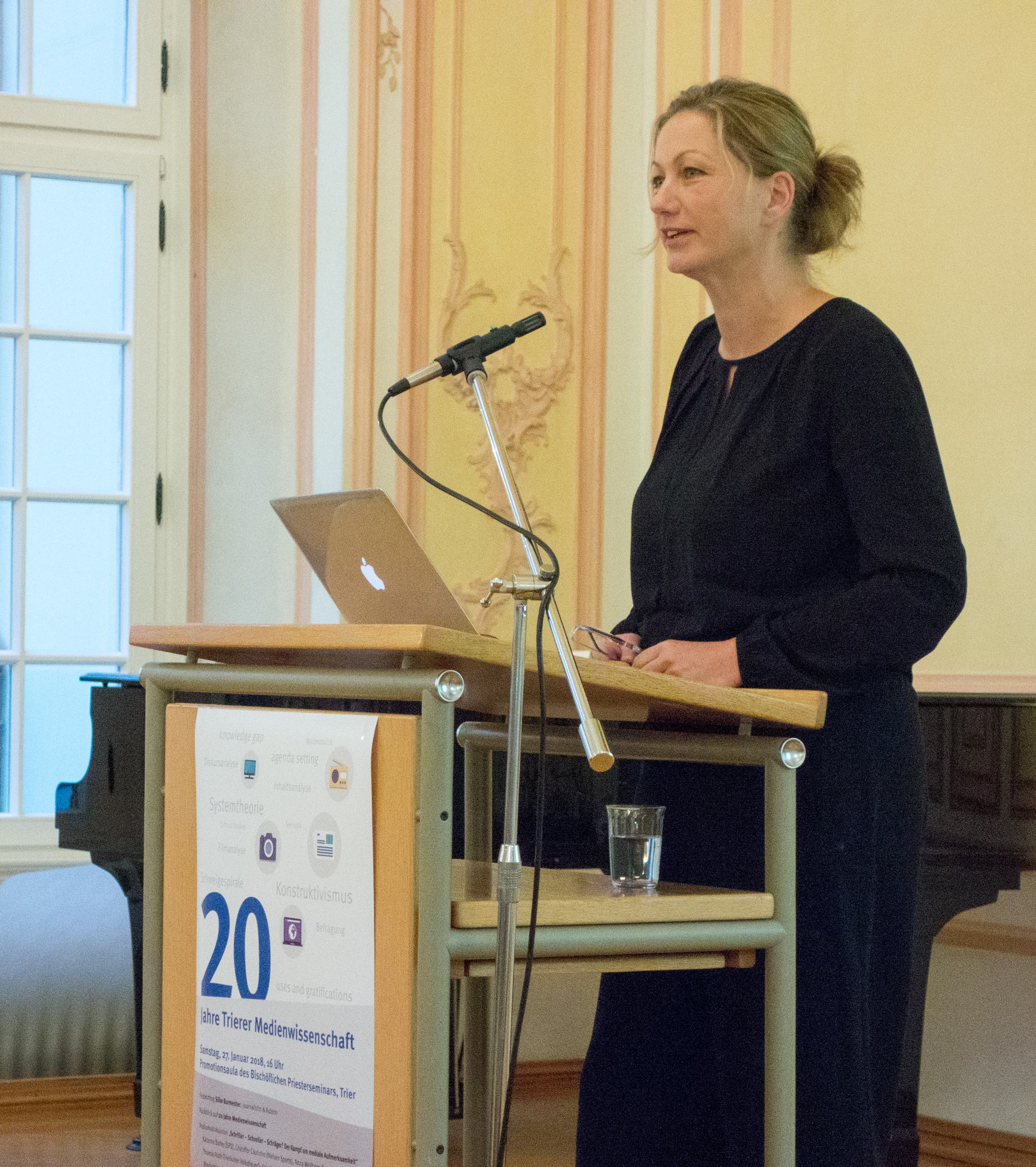
"Media are about retaining the good", the journalist asserted at the beginning of her talk, before speaking about the fundamental changes in journalism of the past 20 years. The internet has changed all processes, like a worm you have to feed. And the internet "made media the hot shit", something that everybody wants to do.
Today, it is not only about fostering the net, but "to become the hot shit oneself": journalism is more important than ever before, but young people today want to become influencers — a democratic way in principle, not excluding anybody, as long as you manage to get enough followers.
Today, the media are the stage for all sorts of things. But these things push aside the necessary things, and this is the problem.
Silke Burmester
Moments of temptation also exist for journalists, especially in face of sinking wages of freelance journalists and photographers. Many young colleagues want to become influencers themselves, e.g. as moderators. "In this case, the ego is in the foreground: You do not want to disappear behind the content, but become content oneself."
Obviously, such desire of fame has led to great moments of journalism, e.g. in the case of Stefan Aust‘s Spiegel TV. However, vanity can also become a trap for journalists.
The loud journalism
It is not a good time for quiet people — today‘s journalism is loud, with journalists working on their own brand, being unsure in face of influencers. "The show pushes journalism aside", the journalist explained, not without mentioning that this has always been the case, especially in commercial television.
But still, as Silke Burmester said hopefully, readers also acknowledge journalistic work. It has been a valuable experience of realizing that her readers stand behind her, Silke Burmester said. Publishers have also started searching for solutions. Silke Burmester in particular referred to research groups which led to the publication of the Panama papers, for example. "Here, journalistic work is again in the foreground, and journalists stay journalists." And who knows, maybe there will be news influencers one day. Or all this might be a sign of a change of generation — "and such changes always hurt one side."
Panel discussion: The fight for attention in the media
The "loud media" were also the topic of the panel discussion, moderated by honorary professor Joachim Blum: "The fight for attention in the media". As I had to talk about a couple of details concerning the later tribute to our alumni, I did not attend the whole discussion, but I try covering the content as good as possible nonetheless.
Sven Teuber, spokesperson for social political matters of the party SPD in Rhineland-Palatinate, took the place of Katarina Barley, who participated in the coalition talks at the same time. With Thomas Roth (editor in-chief of the local newspaper Trierischer Volksfreund) and Anja Weckmann (leader of the local studio of the radio channel SWR), we had two additional experienced persons of the media on the stage. And obviously, we also recruited alumni of media studies: Cristoffer Coutinho (Nielsen Sport) and Anna Weilberg (Femastics).
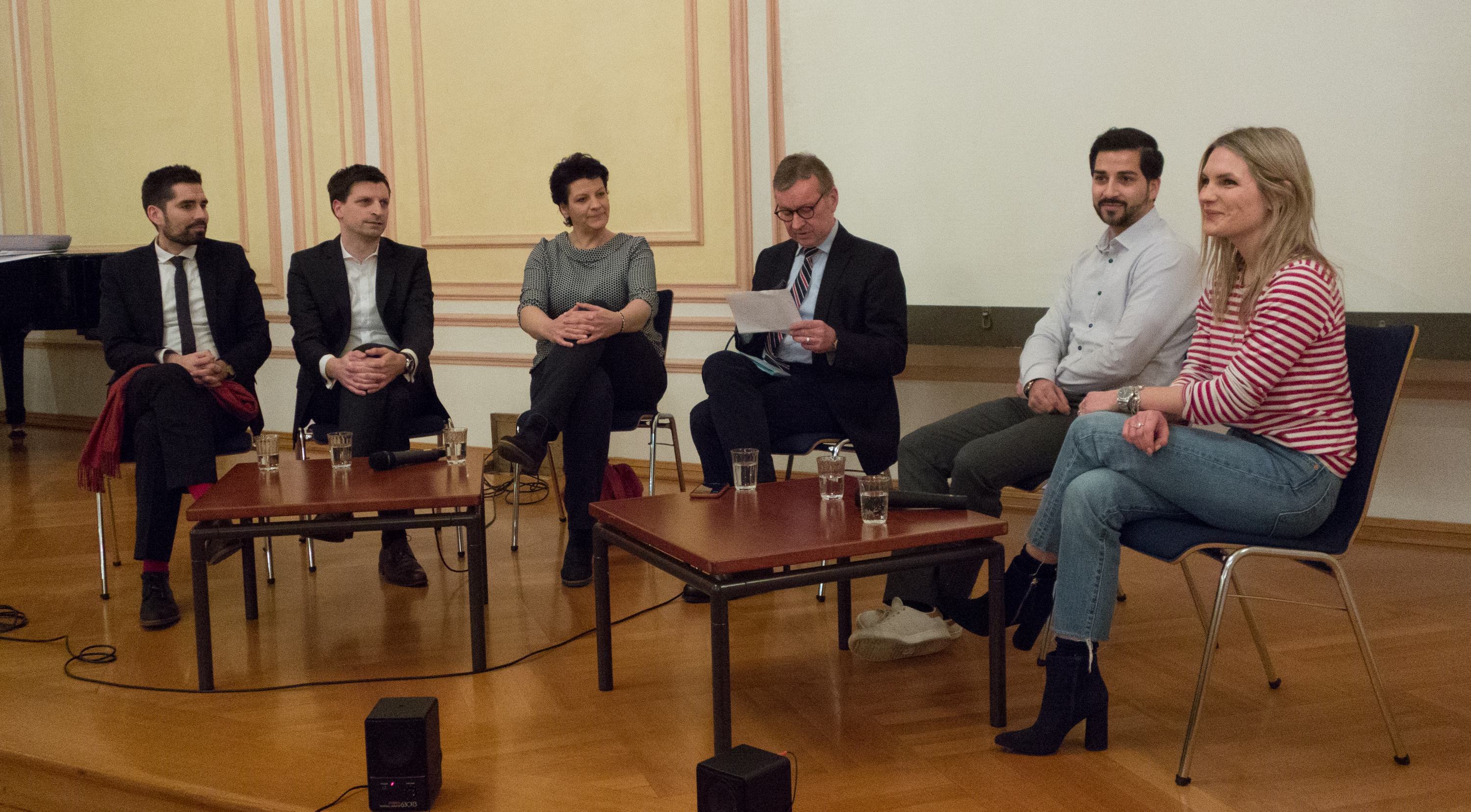
The power of social media in political discourse
There was a lot of talk about the influence of social media in political discourse during the last months. Few weeks ago, the citizens of Trier had to decide in a public decision whether a gas station in the centre should be removed or continued to be leased. In the end, the pro gas station group won.
Joachim Blum gave this example in order to ask whether this has been a triumph of the pro group with the help of social media. “The word triumph goes too far in my view”, Anja Weckmann explained, and Thomas Roth supported this opinion: “In public decisions, it is always possible that a group which is smaller in numbers wins if it manages to mobilize more of its followers.”
“It has certainly be a political defeat for us”, Sven Teuber said, pointing to the fact that his party took stance against the gas station. He also blamed the communication strategy for the result. “The gas station was not meant to go away, but should be moved to somewhere else. But this message didn’t come across. In the discussion, the topic quickly concentrated on a metropolitan charisma.” To some degree, established media were also responsible for this impression, as they fuelled the corresponding emotions.
New relevance criteria
Starting from Trier, Joachim Blum switched to broader topics: On the 4th of March 2018, Swiss citizens decide about the financing of the public radio service, including its existence. “It is our task to reach the people”, SWR studio leader Anja Weckmann made clear. “However, there a more publications chasing us, and we have to ask ourselves how to react.” In general, the relevance of topics has changed. “Social media is an additional channel in public discourse”, Cristoffer Coutinho explained. This creates new topics, not possible without social media. In the end, however, it is important that journalism keeps its freedom.
Anna Weilberg stressed another aspect of the changed possibilities in digital media: Since becoming self-employed, she has more freedom to work on her own topics. “We can now more and more decide what is important on our own, not only keeping an eye on reach.“
In the later parts of the discussion, Joachim Blum also spoke about Silke Burmester’s thesis of the loud journalism. He critically asked whether these new criteria also lead to the calculated creation of scandals. Anja Weckmann and Thomas Roth had important remarks to make. It is not the case that only loud journalists have a chance, the SWR studio leader said. While it is true that an extroverted nature is typical for journalists, it is the heterogeneous mix of people which decides about the success of a journalistic publication. This also includes introverted and analytical people. And Thomas Roth pointed out that reluctance is also important, in particular in local journalism.
But is there a trend towards scandals? “We have to decide much faster”, Thomas Roth said. Sven Teuber mentioned a noticeable trend toward tabloidization, but also stressed that time plays a huge role: journalists have less and less time for researching a topic.
Social media as a discourse free of control?
Joachim Blum started the final round with a classic quote in media studies: “If everybody can publish on the social web, isn’t this the ideal of a discourse free of control, like Jürgen Habermas said?”
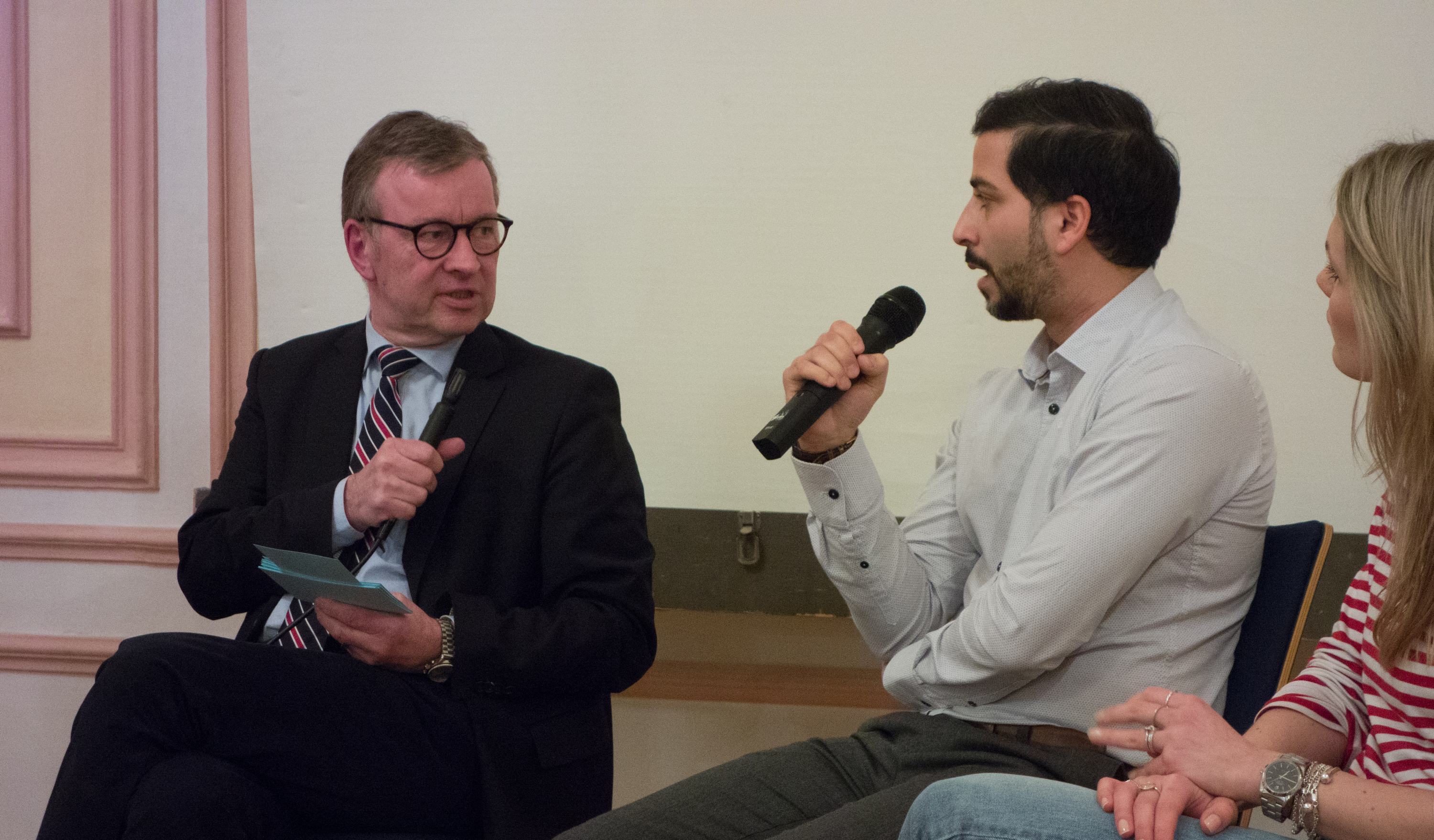
The potential of social media is positive, Femtastic publisher Anna Weilberg explained. “Furthermore, you do not get the attention for nothing, but you have to be heard and have a weight.” An important aspect, as Cristoffer Coutinho agreed. In social media, quality wins.
“And the pluralistic media also create new topics”, Anja Weckmann said. However, the role of traditional media is to stay calm: “This is the horse that we ride.” But still, as Thomas Roth added, you have to ask who controls this horse. It is important not to let algorithms and newsfeeds decide on topics. There also have to be others, like newspapers.
Sven Teuber agreed, but also drew a more pessimistic summary. The importance of algorithms is growing: “We are living more and more according to algorithms, and less according to our heads. This affects the fundamentals of a democratic society.”
Speeches: past and future of media studies
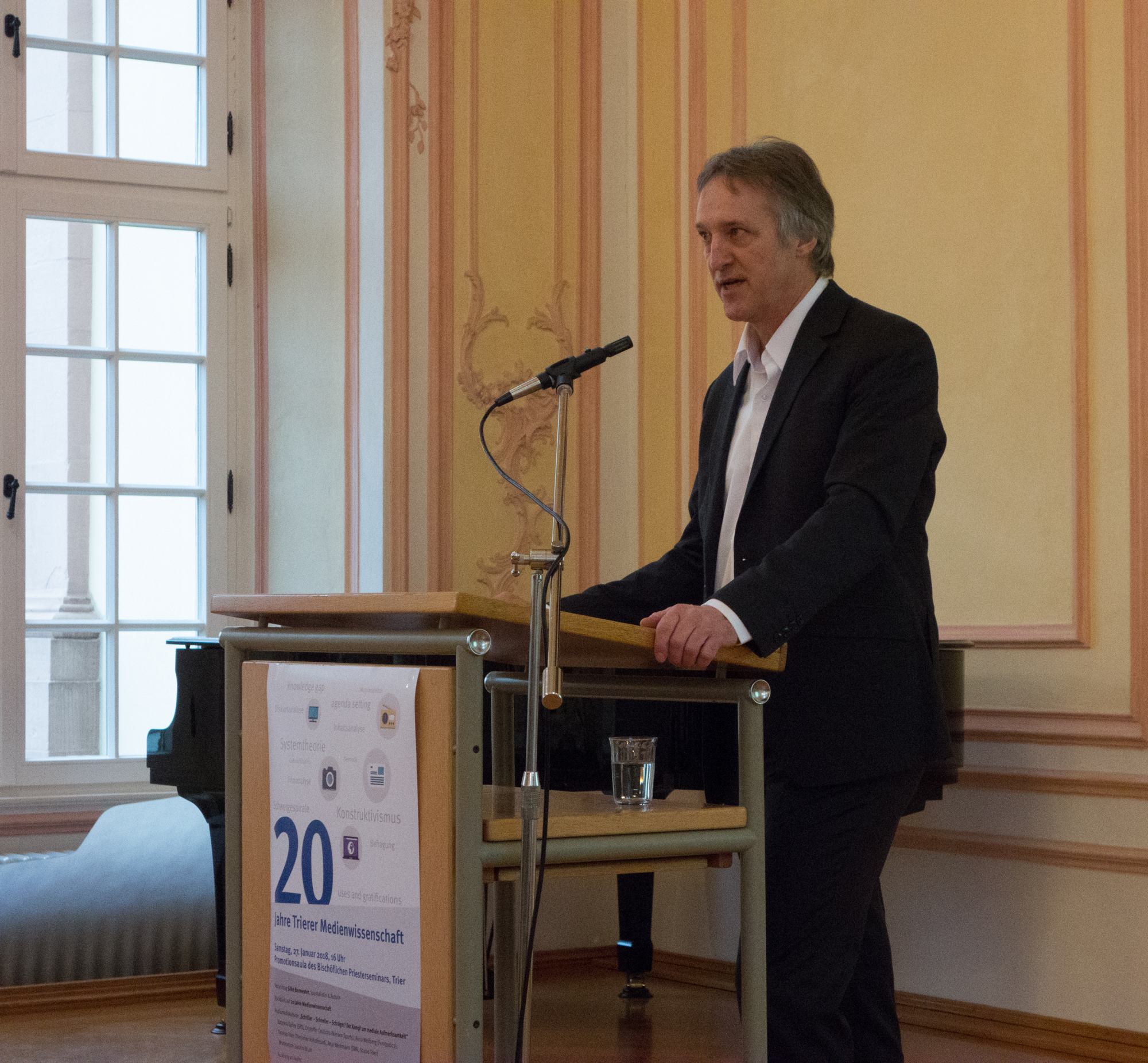
Obviously, numerous speeches looking back and forth weren’t missing in the celebration. Professor Hans-Jürgen Bucher, university president Michael Jäckel, and Sebastian Hoffmann, dean of the faculty, gave insights into the creation of the field of study in 1997. Two developments determined the further path: the success of the internet and the reform of Bologna.
- In 1994, the prevailing impression was that there was a lack of job opportunities, so there should be no major in media studies. Only a short time later, it became clear how wrong this impression was, as the internet started to become mainstream. “The high dynamics of the digitalization have been chance and challenge for our field of study at the same time”, Hans-Jürgen Bucher explained. He also gave various examples of this development in research and teaching: the introduction of digital learning platforms, experiments with new possibilities like the Twitter wall in the auditorium, or conferences like “newspapers between print and digitalization” in 1998.
- Following the Bologna reform, the old magister degrees have been transformed into the system with bachelor and master degrees since 2007. The demand is still strong, as there are currently about twenty applicants for a single place.
6 million Euro of third-party funds, this is a sign of excellent research.
Sebastian Hoffmann, dean of the faculty II
Hans-Jürgen Bucher also had other figures: 450 graduates, ten promotions, two habilitations, 40 teachers and six millions of third-party funds – “this is a sign of excellent research”, as the dean agreed. Additionally, there is the unique orientation with two specializations: the audiovisual part around professor Martin Loiperdinger focuses on early cinema and other historical audiovisual media, while the team surrounding professor Hans-Jürgen Bucher covers the topics of print and online media.
Besides the speeches, the works by students created around the anniversary were particularly impressive. There has been a great video, created by the student union, which reminded me of many nice memories. The team of the online magazine explained what the audience can expect when the magazine goes online. I followed the work on the magazine from the side and am very impressed of what has been created under the supervision of Hans-Jürgen Bucher, Eberhard Wolf (Art Director/Head of Design at the newspaper Luxemburger Wort) and Paul-Josef Raue (journalist).
Emotional tributes
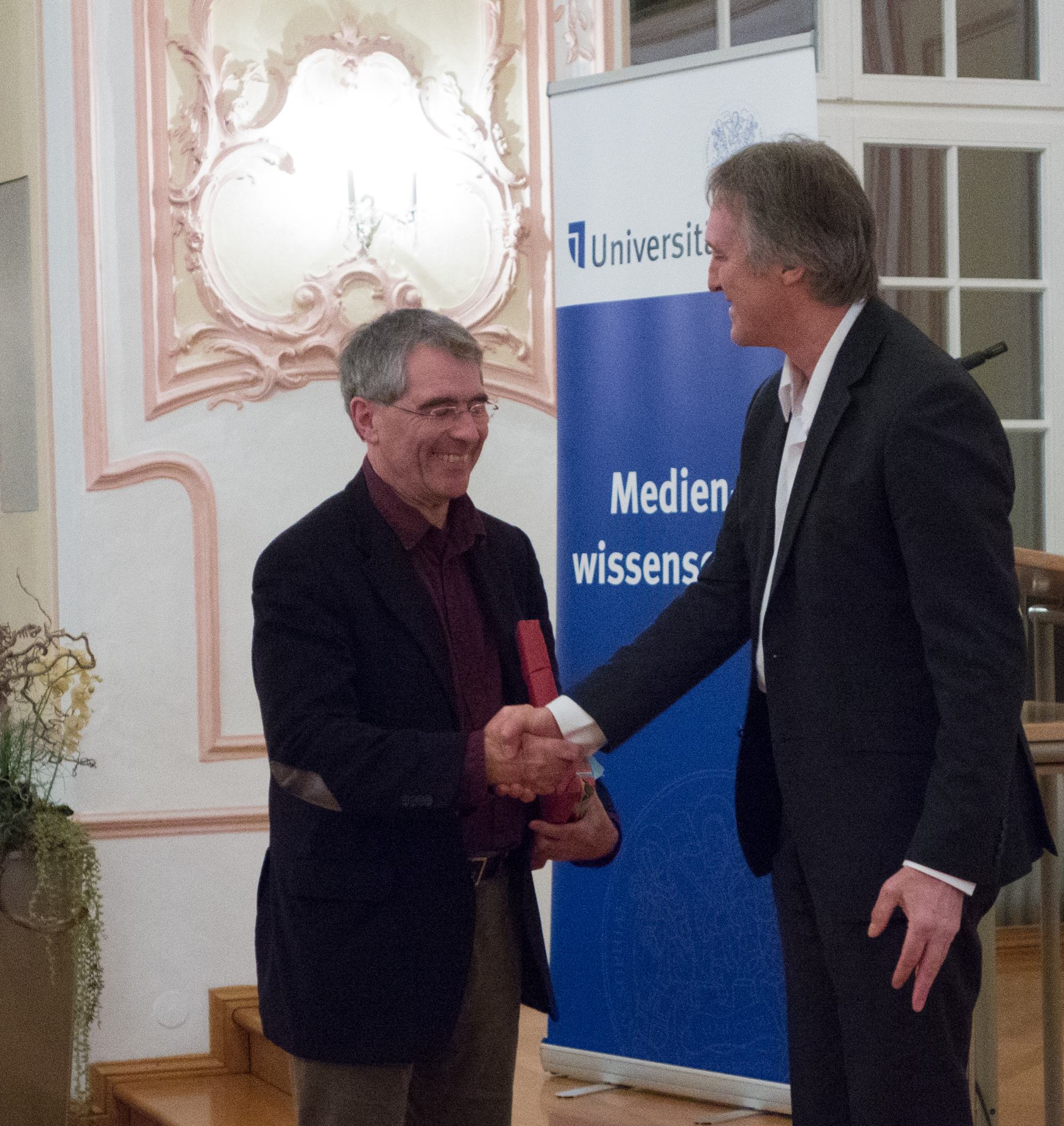
20 years of media studies – after a period of time like this, a field of study is also at a transition point. Professor Martin Loiperdinger took the opportunity to pay tribute to Marie Luise Sachs, long-year secretary, who will be retiring. I have never counted how often I have been in her office and profited from her accommodating way of work.
But, Martin Loiperdinger is himself also retiring in March, meaning that an emotional tribute was not missing. My personal highlight in this regard was the surprise film made by students in his honor. Naturally, it started with a train arriving at the Trier train station, reminding of "Arrival of a Train at La Ciotat", an early film by the pioneers Auguste and Louis Lumière – I do not think there is any media scholar in Trier who has not seen it.
Further tribute was paid to Professor Klaus Arnold, who passed away last year. He has not only expanded the field with valuable topics, but was also highly engaged in our alumni and students association Medianetz – the day of media studies and the media tandem are evidence of his work.
Digitalization at the center of the future
Thus, the anniversary had various tributes, with another one just around the corner, as Hans-Jürgen Bucher will also be retiring next year. No wonder that this created questions concerning the future of media studies.
"We want to realign the field of study from the ground up", the dean explained. The future focus is on digitalization, which should strengthen the profile of the University of Trier. The new focal points in research and education are thus on "digital and audiovisual media" as well as "journalism and communication". Two professorships are currently advertised. To me, these seem to the right directions, and a logical advancement. I am looking forward to seeing how this turns out in practice.
Tribute to the alumni
Our tribute to last year's alumni was also part of the program. Congratulations to you all!
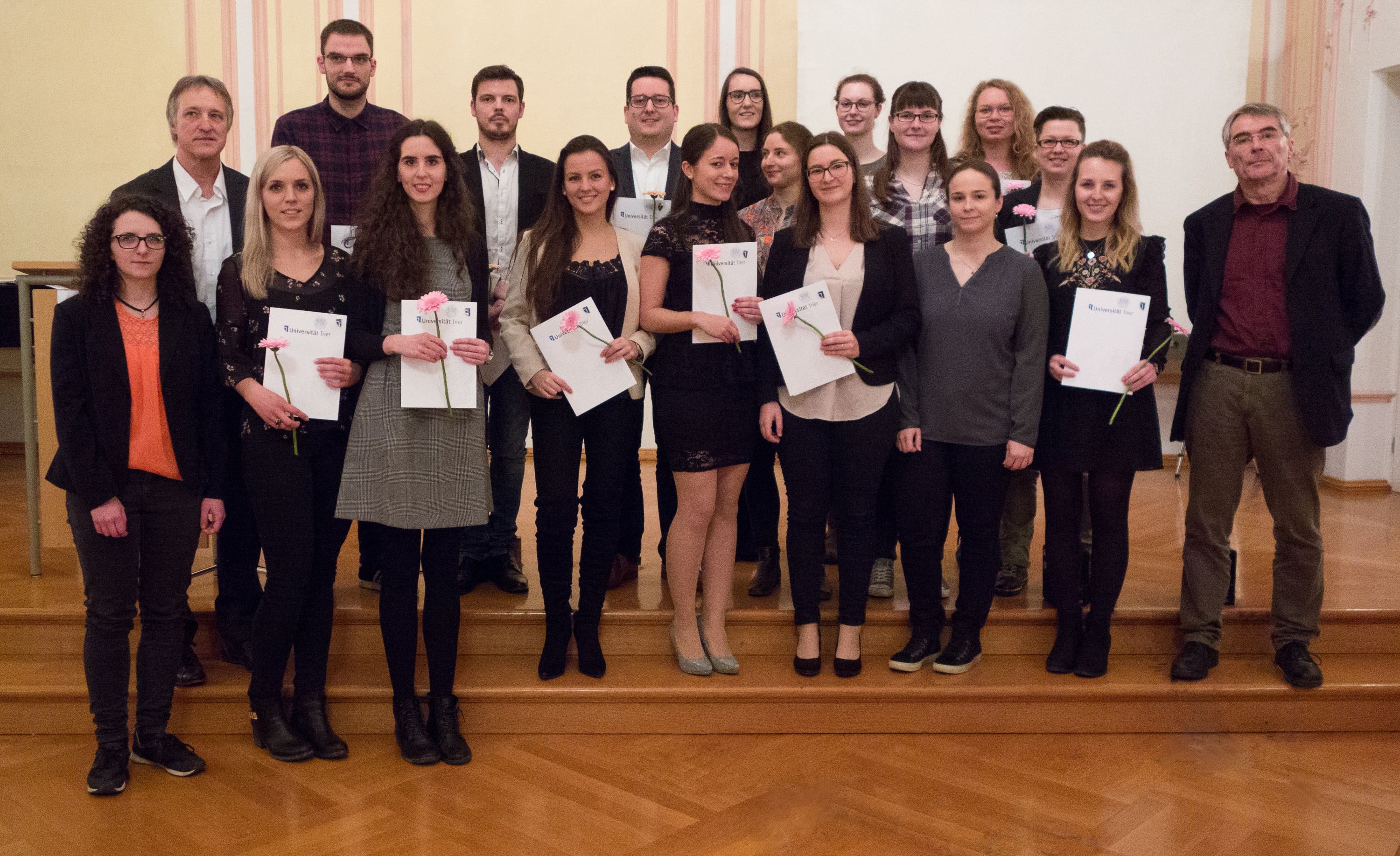

 11 minutes estimated reading time
11 minutes estimated reading time 